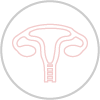The pelvic floor muscles are a layer of muscles that stretch from the pubic bone at the front of your pelvis, to the coccyx (the tailbone) at the back. It is hammock like, and structured to fill the ‘hole’ that your bony pelvic ring creates, and acts like a muscular trampoline to your undercarriage. The muscles ‘hold on’ all day long to provide support to your pelvis, and to stop you leaking. When you want to go to the toilet, they relax so that you can pass urine and/or open your bowels. Then they tighten up again afterwards to restore control. If you cough, sneeze, laugh, exercise or lift something heavy, they have to hold on even tighter to withstand the additional pressure. They should be in a constant state of activity to provide muscular support to your pelvic organs above.
Benefits of a good strong pelvic floor:
- Support to the trunk and the pelvic organs (the bladder, the womb (uterus) and the bowel)
- Continence – controlling passing of urine, stools and wind during pregnancy, post-natally, or later in life
- Sexual function – improved sensitivity, activity and control
- Positioning of baby during latter stages of pregnancy, for effective labour and delivery
- Avoidance of the need for surgery
The pelvic floor muscles are frequently overlooked, even though they are one of the most important muscle groups in the body. Many people are unaware of how to correctly exercise the pelvic floor muscles, or forget to work them at all. This can lead to problems sooner or later.
When the pelvic floor muscles become damaged, weakened or stretched they may no longer work properly.
Causes of pelvic floor muscle weakness:
- Lack of use, incorrect use
- Weight of baby and uterus contents during pregnancy
- Childbirth – over-stretching, tearing, prolonged labour, forceps/suction delivery, c-section, size of baby, episiotomy
- Lots of heavy lifting – job related, babies/toddlers/children
- Constipation and regularly straining to empty bowels, or bladder
- Carrying extra weight
- Hormonal changes – pregnancy and menopause
- Gynaecological surgery
- Nerve injury – childbirth, trauma, surgery, chronic health conditions
- Weak abdominal muscles and buttock muscles
Strengthening the pelvic floor muscles for postnatal women is really important and keeping your pelvic floor muscles in check during pregnancy is vital too. I’m always surprised to meet pregnant and post-natal women who admit they are not doing their pelvic floor muscle exercises, despite the risks they run if they don’t.
If you have no idea where to start, you want to check you’re doing it right, you want to prevent problems in the future, you want to improve your quality of life now as you’re fed-up, then don’t put it off any longer! Book in with Embrace Physio sooner rather than later!
Physiotherapy for your Pelvic Floor:
- Full assessment of your spine, pelvis, legs
- Internal assessment (with consent) of your perineum, vagina, pelvic floor muscle, sensation, strength, endurance and activity
- Correctly teaching appropriate pelvic floor muscle exercises
- Manual therapy as indicated – for scarring, dilation, stretching, soft tissue release, trigger point release, myofascial release, desensitisation
- Educate about pelvic floor and it’s function
- Advice re: exercise, diet, lifestyle, job, gym, sports, hobbies
- Bladder and bowel re-training as required
- Advice and exercise for return to fitness/sport/classes
- Muscle stimulation and biofeedback as indicated
- Emotional support
- Acupuncture



